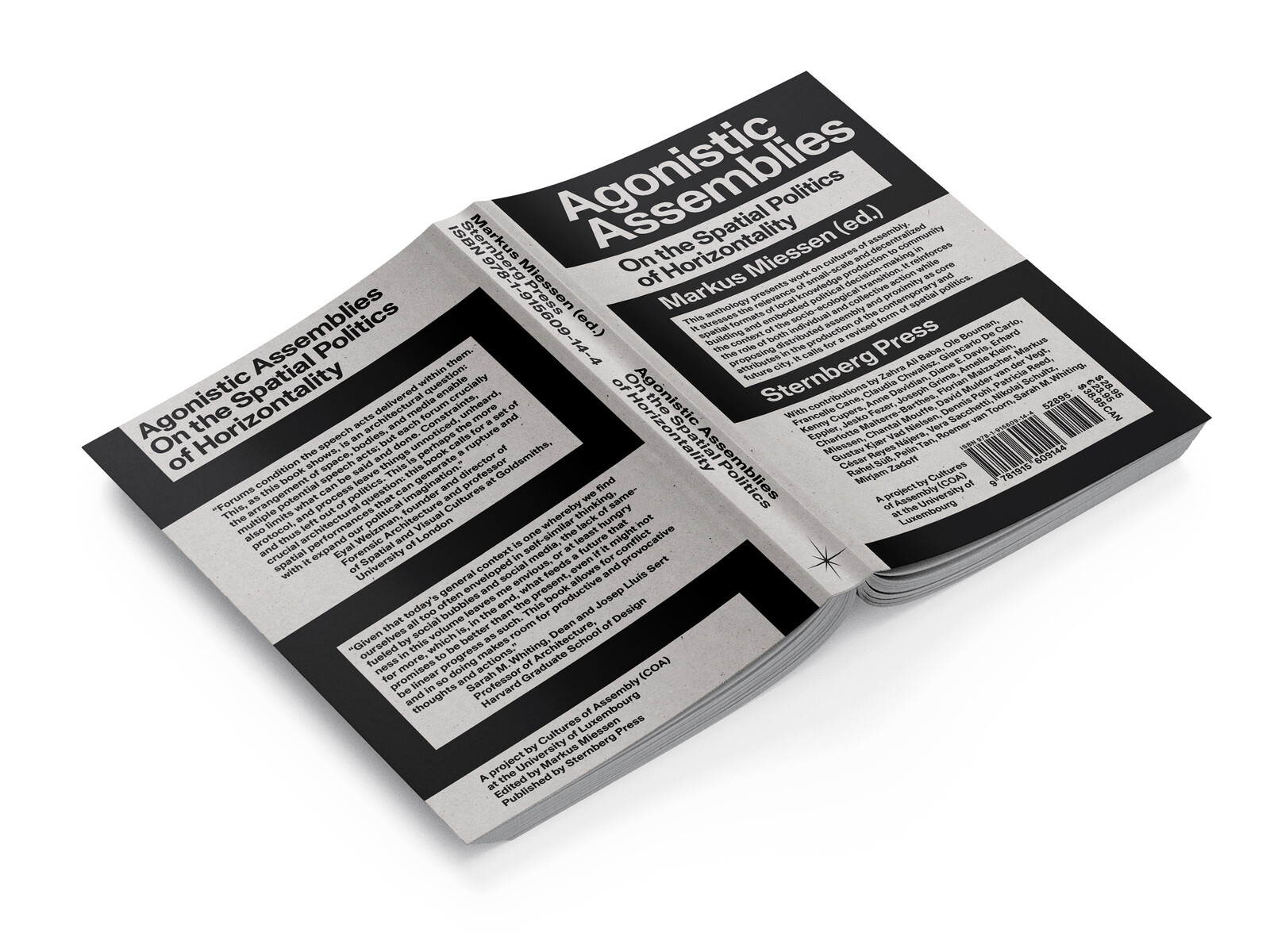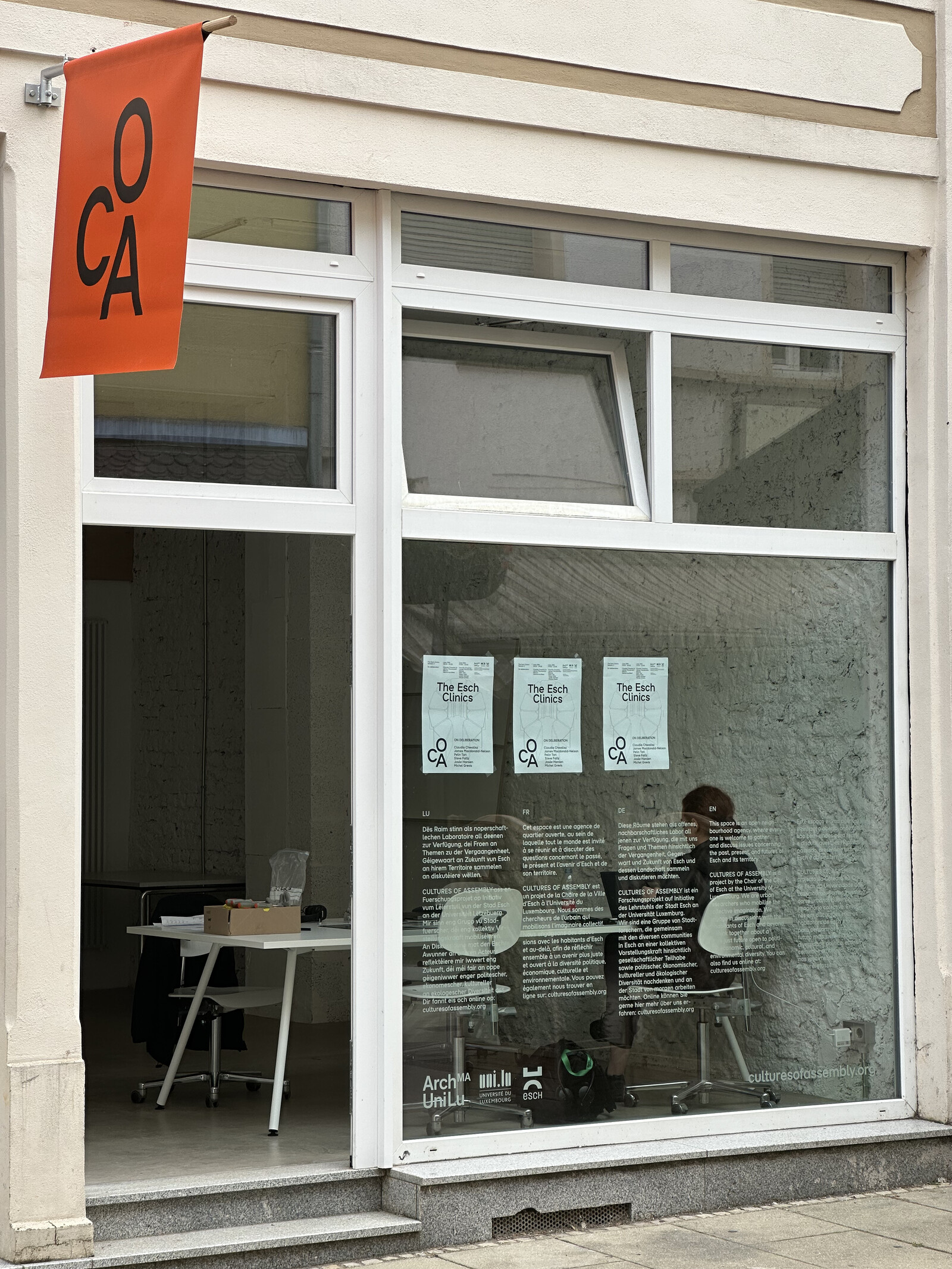2 Av. de l'Universite, 4365 Esch-sur-Alzette
L- Luxembourg
Luxembourg
Agonistic Assemblies
Cultures of Assembly (COA), the research unit of the Chair of the City of Esch, at the University of Luxembourg, is happy to present two recent projects on the spatial politics of assembly: a new book as well as an urban agency and community space in the city centre of Esch-sur-Alzette.
Markus Miessen’s ongoing research trajectory Cultures of Assembly was initially kicked off in 2010, during a Harvard GSD fellowship in collaboration with Joseph Grima, in which the two architects investigated the sociopolitical dimension of (urban) spatial design. Observing the Kuwaiti cultural and social landscape with a specific interest in the politico-spatial phenomenon of Diwaniya, this distributed urban form of para-institutional assembly established a starting point for a long-term body of research, now published as an anthology in a book reflecting on cultures of assembly.
Agonistic Assemblies (Sternberg Press, 2023) is a call for a revised form of spatial politics. It stresses the relevance of small-scale and decentralized spatial formats of local knowledge production to community building and embedded political decision-making in the context of the socio-ecological transition. It reinforces the role of both individual and collective action while proposing distributed assembly and proximity as core attributes in the production of the contemporary and future city.
The book asks: how can spaces—both physical and virtual—be envisaged to create publics? How is collectivity and society being generated spatially and in terms of policy? How do we “practice” society as a bodily, spatial form, and how does this practice contribute to spatial justice? Are there specific spatial settings that can intensify these practices? What kind of spatial design can we imagine as platforms for change?
This project articulates a curatorial impetus towards urban policy making in conjunction with spatial proximity as a tool to mediate between the individual, the collective, the neighborhood, the city, state politics, and society at large. If we understand assembly as a form of spatial gathering, and the bonfire as the prehistoric space of assembly, what constitutes its contemporary equivalent?
Markus Miessen, ed. Agonistic Assemblies. On the Spatial Politics of Horizontality. Sternberg Press, 2023.
Contributions by Zahra Ali Baba, Ole Bouman, Francelle Cane, Giancarlo De Carlo, Claudia Chwalisz, Kenny Cupers, Anne Davidian, Diane E. Davis, Erhard Eppler, Jesko Fezer, Joseph Grima, Amelie Klein, Charlotte Malterre-Barthes, Florian Malzacher, Markus Miessen, Chantal Mouffe, Gustav Kjaer Vad Nielsen, César Reyes Nájera, Dennis Pohl, Patricia Reed, Vera Sacchetti, Nikolaj Schultz, Rahel Süss, Pelin Tan, Roemer Van Toorn, David Mulder Van Der Vegt, Sarah M. Whiting, Mirjam Zadoff.
From Research to Urban Policies
Miessen’s long-term research on assemblies has also materialized as a project of the Chair of the City of Esch at the University of Luxembourg, and is committed to the study and promotion of para-institutional civic assemblies, experiences of decentralised power, and decision-making structures that seek spatial justice in cities. To this end, the project has developed a transversal format consisting of a digital platform alongside an open neighbourhood agency in the centre of Esch-sur-Alzette, a city in the south of Luxembourg, at the heart of the former European steel industry. From this physical and virtual community space COA inquires realities around civic space and community care.
In the transformation from heavy to service industry, the renewal of many European cities has been accompanied by the rapid growth of the tertiary sector and the knowledge economy. This process—taking place under the premise of a neoliberal economy—has been characterised by an increase in social and spatial inequality, as well as the weakening of a public sphere and the loss of political agency. In this context, it is crucial to deliberately maintain spaces of collective memory and gathering, including the maintenance of seemingly residual places, which may be associated with marginalised groups. COA strategy is to investigate at street level in close interdependence with the city’s diverse social actors and their spontaneous use of non-regulated spaces.
The neighbourhood agency is hosting assembly-mode conversations with local social agents, neighborhood initiatives, institutional representatives, politicians, economic agents, and international experts to discuss the role and value of low threshold design discourses, the production and use of urban space, para-institutional approaches to (urban) design, models of embedded and immersive learning, spaces for experimentation in cities that will support the agency of native knowledges, the care of urban commons and citizen advocacy, the necessity of small granularity of democratic units, bringing public discourse to the heart of the city, and clearing the threshold between university and public.
The theoretical research initiated around the phenomenon of Diwaniya back in 2010 keeps growing in a consistent context-situated urban agency creating spaces of encounter, where civic initiatives communicate and cross-pollinate with academic research, aiming to inform the process of urban regeneration, the formulation of contemporary critical spatial practices, and new models of democratic participation.
COA team: Markus Miessen, César Reyes Najera, Marija Marić, Francelle Cane, Hannes Grassegger.
Contributions by Clémentine Deliss, Rahel Süß, Dennis Pohl, Albena Yaneva, Finn Williams, Gabu Heindl, Keller Easterling, Giovanna Borasi, Claudia Chwalisz, Oana Bogdan, Olaf Grawert, Ana Miljački, Jonas Staal, Florian Malzacher, Amica Dall, Christian Weis, Zaida Muxi, Josep Maria Montaner, Equal Saree, Top Manta, Clara Nubiola, Las Kellys, Col·lectiu Punt 6, Jesko Fezer, Vera Sacchetti, Gustav Kjær Vad Nielsen, Diana Smiljkovi, Rachael Tsai, Jack Rusk, James Macdonald-Nelson, Pelin Tan, Steve Faltz, Josée Hansen, Michel Grevis, Joy Rodrigo, Cindy Rodrigues, Dan Draut, Mauro Almeida Cabral, Artur Cardoso Pereira, Sacha Breuer, Xavier Iaru, Gilles Heinesch, Ivo Silva, Petra Vankerkom, Dave Lefèvre, Anja Hoscheit, Claude Gérin, Boris Traue, Judith Tröndle, Tom Didlinger, Joe Birsens, Emmanuel Cornélius, Daisy Wagner, Philippe Nathan, Denis Scuto, Liz Braz.
Don’t miss COA events and results in 2024!






